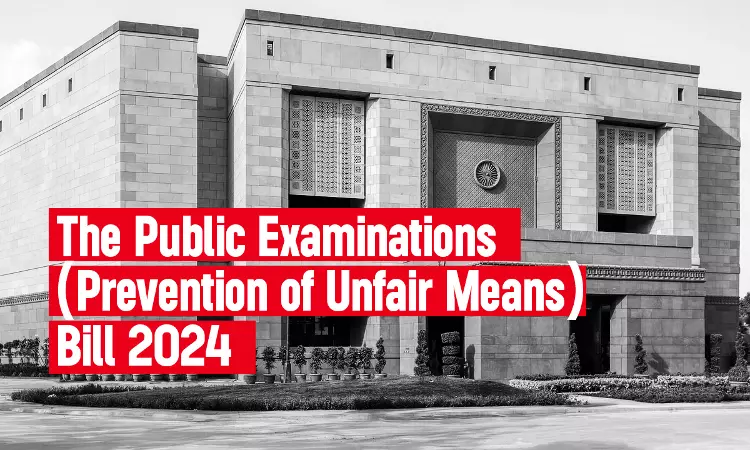Introduction
The objective of the bill is to bring in greater transparency, fairness and credibility to the public examination systems.
The Public Examinations (Prevention of Unfair Means) Bill, 2024 was introduced in Lok Sabha on February 5, 2024. The Bill seeks to prevent use of unfair means in public examinations. Public examinations refer to examinations conducted by authorities specified under the Schedule to the Bill, or notified by the central government.
These include:
(i) Union Public Service Commission,
(ii) Staff Selection Commission,
(iii) Railway Recruitment Board,
(iv) National Testing Agency,
(v) Institute of Banking Personnel Selection, and
(vi) Departments of the central government and their attached offices for recruitment.
Exams which are considered ‘public examinations’
Exams which are considered ‘public examinations’ Under Section 2(k), a ‘public examination’ is defined as any exam conducted by a ‘public examination authority’ listed in the bill, or any other authority as notified by the central government.
The bill lists five public examination authorities including: –
-The Union Public Service Commission (UPSC), which conducts the civil services examination, combined defense services examinations, combined medical services examination, engineering services examination.
– The Staff Selection Commission (SSC), which recruits for Group C (non-technical) and Group B (non-gazetted) jobs in the central government.
-The Railway Recruitment Boards (RRBs), which recruit Groups C and D staff in the Indian Railways.
– The Institute of Banking Personnel Selection (IBPS), which hires at all levels for nationalized banks and regional rural banks.
– The Institute of Banking Personnel Selection (IBPS), which hires at all levels for nationalized banks and regional rural banks.
– National Testing Agency (NTA), which conducts the JEE (Main), NEET-UG, UGC-NET, the Common University Entrance Test.
-Other than these, all the ministries and departments of the central government recruiting staff also count under the new law.
Offences in relation to public examinations:
The Bill defines several offences in relation to public examinations. It prohibits collusion or conspiracy to facilitate indulgence in any unfair means.
It specifies unfair means to include:
(i) unauthorized access or leakage of question paper or answer key,
(ii) assisting a candidate during a public examination,
(iii) tampering with computer network or resources,
(iv) tampering with documents for shortlisting or finalizing of merit list or rank, and
(v) conducting fake examination, issuing fake admit cards or offer letters to cheat, for monetary gain.
It also prohibits:
(i) disclosing exam-related confidential information before time, and
(ii) unauthorized people from entering exam centers to create disruptions. Above offences will be punishable with imprisonment between three and five years, and a fine up to Rs 10 lakh.
Responsibilities of service providers:
Service providers are required to notify the relevant examination authority and the police in the event that any of the Bill’s provisions are broken. An organization that supplies computer resources or any other kind of assistance to a public examination authority is known as a service provider. It will be illegal to not report such instances. Should the service provider themselves commit a crime, the investigating authority is required to notify law enforcement. The Bill forbids service providers from changing the exam location without the examination authority’s consent. A service provider that commits an infraction faces a fine of up to one crore rupees. From such a service provider, the examination’s proportionate cost will also be reimbursed.
Organized crimes:
Organized crime will have a harsher penalty according to the bill. An illegal conduct carried out by an individual or group of individuals to pursue a common interest for unjust benefit in connection with public examinations is classified as an organized crime. A fine of at least one crore rupees and a prison sentence ranging from five to ten years would be imposed on those who conduct organized crime. If an organization is found guilty of organized crime, its assets will be seized and confiscated, and it will also be responsible for recovering a share of the investigation’s costs.
Inquiry and investigation:
All offences under the Bill will be cognizable, non-bailable, and non-compoundable. No action will count as an offence if it is proved that the accused had exercised due diligence. An officer not below the rank Deputy Superintendent or Assistant Commissioner of Police will investigate the offences under the Act. The central government may transfer the investigation to any central investigating agency.
Conclusion
In the recent years across the country, there have been a large number of cases about question paper leaks. The move came against the backdrop of cancellation of a series of competitive tests such as the teacher recruitment exam in Rajasthan, Common, Common Eligibility Test (CET) for Group-D posts in Haryana, recruitment exam for junior clerks in Gujarat and constable recruitment examination in Bihar following question paper leaks. The objective of the bill is to bring in greater transparency, fairness and credibility to the public examination systems and to reassure the youth that their sincere and genuine efforts will be fairly rewarded, and their future is safe.


Das finden wir verbesserungwürdig und wir
sind der Meinung, dass das auch schneller gehen kann.
Damit nutzt der Betreiber die selben Sicherungsmechanismen wie Banken beim online Banking.
Einer der wichtigsten Aspekte bei der Wahl eines online
Casinos ist der Aspekt der Sicherheit. Die Rival Gaming Software ist dafür bekannt, eine extrem große Auswahl der
beliebten online Automaten anzubieten. Einen Großteil des
Angebots bilden die online Slots von Rival.
Der andere Willkommensbonus ist ein 50% Spiele Bonus von bis zu 155
Euro.
Da Vinci’s Gold Casino bietet eine Vielzahl
von Zahlungsmethoden, die sowohl traditionelle als auch moderne Optionen umfassen.
Diese Vielfalt sorgt für ein abwechslungsreiches Spielerlebnis und bietet für jeden Geschmack etwas Passendes.
Die Nutzung des Da Vinci’S Gold Casino Cashback Bonus bietet
Spielern in Deutschland zahlreiche Vorteile. Um den Da Vinci’S
Gold Casino Willkommensbonus in Anspruch zu nehmen, sind
nur wenige Schritte notwendig.